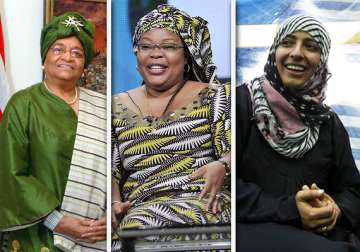Oslo, Oct 7: The 2011 Nobel Peace Prize was awarded today to three women - Liberian President Ellen Johnson Sirleaf, Liberian peace activist Leymah Gbowee and Tawakkul Karman of Yemen for their work on women's rights.
The Norwegian Nobel Committee honoured the three women “for their non-violent struggle for the safety of women and for women's rights to full participation in peace-building work.”
Johnson Sirleaf, 72, is a Harvard-trained economist who became Africa's first democratically elected female President in 2005. She faces a Presidential poll this month.
She was seen as a reformer and peacemaker in Liberia when she took office. But recently, opponents in the presidential campaign have accused her of buying votes and using government funds to campaign. Her camp denies the charges.
Liberia was ravaged by civil wars for years until 2003. The country is still struggling to maintain a fragile peace with the help of UN peacekeepers.
Liberian peace activist Leymah Gbowee, organised a group of Christian and Muslim women to challenge Liberia's warlords. In 2009 she won a Profile in Courage Award, an honour named for a 1957 Pulitzer Prize-winning book written by John F Kennedy, for her work in emboldening women in Liberia.
Tawakul Karman, 32, is a mother of three. She headed the Women Journalists without Chains, a human rights group for journalists. She had been a leading figure in organising the protests in Yemen that opposed the rule of President Ali Abdullah Saleh and which kicked off in late January. Karman's father is a former legal affairs minister under Saleh. She is a journalist and member of Islah party, an Islamic party.
“We cannot achieve democracy and lasting peace in the world unless women obtain the same opportunities as men to influence developments at all levels of society,” the prize committee said.
Yemeni Tawakkul Karman said she had dedicated her unexpected win to all activists of the Arab Spring.
“I dedicate it to all the activists of the Arab Spring,” Karman told Al-Arabiya Television, refering to protesters who took to the streets in several Arab countries demanding democracy.
“I am very happy. I didn't expect this at all,” she said, adding that “the project for freedom and dignity has become a reality.”
“This is an honour for all the Arabs, Muslims and women,” said the woman who has become a leading figure in the months-long nationwide-protests against Yemen's President Ali Abdullah Saleh.
“We are heading towards a beautiful future for our nation,” added the 32-year-old Karman, who has been holed in Sanaa's protest encampment for around four month, in fear of being hunted by the partisans of the veteran leader. “We will work to reach all our (protest) goals, not short of one,” she added.
Protests erupted in January in the impoverished south Arabian Peninsula nation demanding the removal of Saleh, who has been in office since 1978. AFP
Latest World News
